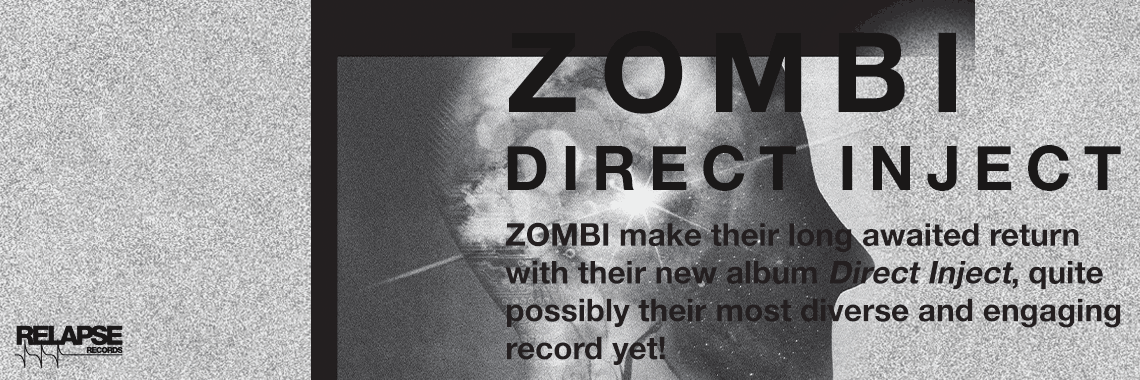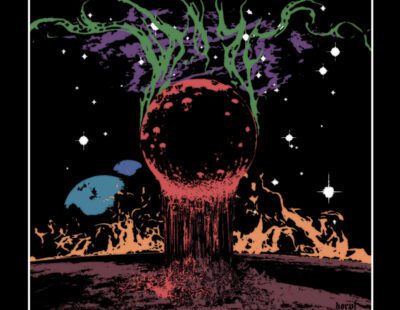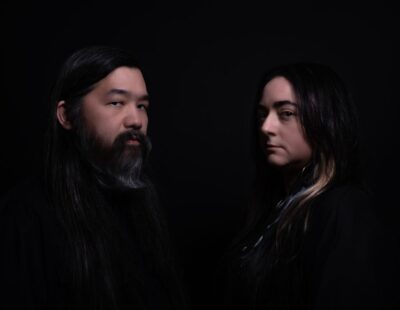
Our latest special issue (pick it up here) culls and ranks the greatest old-school metal albums of all time. Clocking in at an impressive number six is the 1983 classic, Holy Diver. At the time, the band quickly formed out of the fragmentation of Mob Rules-era Black Sabbath with vocalist Ronnie James Dio and drummer Vinny Appice splitting to form the band that became known simply as Dio. When we spoke to Appice about life and those times, the legendary sticksman was more than happy to regale us with stories about the good old days. Trouble being that what he gave us was not only gold, but more than what would have fit on the page allotted in the magazine. Thusly, below we present the full interview.
What’s the story behind yourself and Dio leaving Sabbath to form the Dio band which eventually led to Holy Diver?
From the very beginning, what happened was Ronnie and I were playing with Sabbath and Ronnie had a solo deal. The whole plan was that he was going to make a solo record where he would have invited all of his friends to play on it and it was all going to be songs he wrote and blah, blah, blah. But as things soured with Black Sabbath, he thought about leaving and forming his own band. He told me, asked if I wanted to join him and I was totally in, absolutely! I was in a predicament because Sabbath asked me to stay with them too – everybody should have that problem, right?! I chose to go with Ronnie because we got along really well, we worked well together and we were both in the same location in California. It was easy to get together and do things. So, at first it was just me and him jamming together. He played a little bass and sang and I was on drums and we were at various rehearsal places. We auditioned some guitarists in California. One of them was Jake E. Lee; he came down and was great, but Ronnie decided he wanted to go with a more international flair. So, we went over to England to check out players there. Long story short: we contacted [bassist] Jimmy Bain, he knew [guitarist] Vivian [Campbell], we got together and jammed in London and it was magic. The plan was to come back and rehearse and write stuff taking it one step at a time and see how it panned out. They came over and we started rehearsing at Sound City. We basically got together, smoked a lot of pot and went into the rehearsal room every night at seven o’clock. It was just us and we had our soundman Angelo, who was with us from Black Sabbath, and we all worked together. It was just a great time, hainvg lots of fun playing riffs and jamming. We’d record everything and listen back and see what we wanted to keep and work on. A lot of riffs came from Viv’s previous band. “Stand up and Shout” was part of a song from his old band called “Bottle of Wine.” He played it for us, we changed things around, added new parts and that became “Stand up and Shout.” There was a lot of jamming and we recorded anything and listened back to see what worked or had that little bit of magic in it. Anything went at that point. Here’s a good story to that point about the song “Invisible.” We had one riff for that song that we liked, so we recorded it. The next night we came in to listen to it, but Angelo put the cassette in the four-track backwards, so it played backwards. So, we all started making fun of him, but when we finished busting his balls, we started listening to it and thought, “Man, that’s pretty good!” So the riff was backwards but we all liked it, so we learned how to play it backwards and that became the second part of that song.
That sounds like a pretty big step into the unknown, leaving Sabbath for a band that wasn’t a band. Did you have much material that you felt confident about?
Not at all. Y’know what we had? We had one riff, the chorus of “Holy Diver.” We had nothing. But it was the same way when Sabbath did Mob Rules. We jammed a lot and always worked like that, from scratch. No one had any complete songs. Everything was started from the beginning.
From the time you formed the band and had the album in out it was something like six months. You guys must have gelled super-quickly?
The easy part was Ronnie and I working together. We got along well and had spent time on the road. Ronnie had worked with Jimmy before. Luckily, Jimmy and I clicked. I was playing busier on that album and it worked with the way Jimmy played because he isn’t a busy bass player and Viv was just a great guitar player; it all fit well together. So, what we did was that when we had four songs, we dragged all the equipment across the Sound City complex and through the parking lot, and went to Sound City Recording, set up, recorded four songs, then brought all the gear back over, set up, rehearsed and wrote another four songs. We were just doing our thing and having fun making an album. There was nothing said about making the best album in the world or anything like that. Whatever was happening was happening, it felt right and came from our souls. We didn’t know we were making a classic record.
Was there a point where you felt like you had something special on your hands?
Well, when the album was finished, we’d smoke some pot and started listening to it at ear-deafening volume in the studio. We were like, “Fuck man, this sounds fucking good!” but we were modest about it. My drum tech was like, “This thing is going to go platinum.” We’d be like, “Yeah, right.” We’d be happy if it sold a couple hundred thousand. We were really naive about it, but the feedback when people started hearing it was so positive, people were freaking out. Even Geezer Butler’s wife, Gloria, said to Wendy, Ronnie’s wife, “I knew it was going to be a good album, but I didn’t know it was going to be this good.” And that was after we’d left Sabbath! The reaction was amazingly positive. The album has so much energy on it. I think we were trying to prove a point that Sabbath is Black Sabbath and you’re working under that umbrella of sound with Tony and Gezzer, but Ronnie could do whatever he wanted and prove that he could be a contender.
What was the reaction like when the album was released?
Things really changed when we went on the road. We finished the album in April/May, I think it came out in June, so Wendy booked us a tour. The first dates were opening up for Aerosmith for eight shows and Ronnie hated it. I think we did two and at one of them Joe Perry and Steven Tyler got into a fist fight onstage. That was at the time they were at their most “wound up,” I guess you’d say [laughter]. Ronnie hated opening up for them, he didn’t think it was cool, so we left that tour and went out on our own with Queensryche opening and we played 1-3000 seat theaters. At the first gig – and you talk about modesty again – was a warm-up gig in Antioch, CA at a place called the Concert Barn. We figured we’d go up there, warm up, go over the set and it’ll be cool and whoever shows up, shows up. We thought it’d be maybe a few hundred people. We go up there and we’re barbequing and hanging with the owner and come show time there are 3000 people stuffed into this place. We didn’t really have the endings to the songs down, so if anyone had recorded that gig, they’d hear some really long endings where we’re all looking at each other, “OK? Now!” That was the first gig, then we went on this tour with Queensryche and then the album came out and we watched it climb the charts and started hearing it on the radio in LA. Next thing you know, four months later, we’re playing arenas.
What about the cover art?
Actually, that wasn’t anyone in the band’s idea. It was given to the art department. I don’t know the name of the artist, but he probably came up with it (the album credits Simon Levy and Jerry McManus for art direction and design, Gene Hunter for original art rendering and Wendy Dio for the original concept). Ronnie had the name Holy Diver, so ‘holy’ probably generated the image of the priest and the artist did the art, everyone saw it and went, “Wow!” There were a couple comments like, “Maybe he shouldn’t have the chain around the priest,” but you couldn’t tell Ronnie that shit. Ronnie couldn’t be told what to do. The more you’d tell him, the more he’d do the opposite. He insisted it be what it was and that cover is an amazing piece of artwork. We got a little bit of flak about it, but no big deal. The funny thing was that when we were in Sabbath, there was a lot about putting stuff backwards in the songs and people freaking out and going and killing people or whatever. We were kidding around about putting something backwards on it, so we put Ronnie talking at one point in one of the songs and said, “Let’s see if anyone talks about us.” And nobody said a word. People would go on about the Sabbath albums, but there was nothing, no backwards stuff, on them. On Holy Diver, it’s at the end of “Shame on the Night” and where it starts to fade, Ronnie says, “crucify the diver” backwards.
The popularity of the album has stayed strong over the years. I’m assuming that’s not just from the old dudes, but kids who have discovered the album and band over the internet?
Exactly. I see a lot of that. I just came back from Spain where I was doing a big drum clinic event in Barcelona and afterwards people would come up for autographs and there were so many Holy Diver and Last in Line albums wanting to get signed. It’s amazing to see. Also, we’ve reformed, Vivian, Jimmy and myself with another singer obviously, and we did some gigs last year and the year before and we called it Last in Line. It just started off as some fun jamming. We had such a good time and it just clicked after 20-30 years. Then, I invited my friend Andy Freeman, who sang in Hurricane and Lynch Mob, and he came down and blew everyone away. We rehearsed a couple times and decided to do some gigs. We played Japan, five or six shows in Europe and three or four shows here and the reaction has just been insane. I’m up there playing these songs – we play mostly Holy Diver and Last in Line stuff – and people are going crazy. It’s amazing to think we wrote these songs 30-something years ago and people are reacting the same way. It’s a great feeling knowing that the music touched people like that.
Is the intent to only play the classics? I did notice you had a new song posted on-line…
We did the shows and we got an offer from Frontier Records. We would have done a bunch of more shows, but Viv’s been busy with Def Leppard. But in between all that scheduling stuff, we recorded a new record, which is incredible and we didn’t expect it to come out the way it did. We had Jeff Pilson produce it and sonically it sounds amazing; it sounds like Holy Diver. The drums are up front, it’s thick, everything sounds loud. Writing was easy, again, everything gelled again. We even used some of the instruments that we used on Holy Diver; Vivian had the guitar he used, Jimmy had the bass and I was using the same bass drum I used on Holy Diver, so there are some ties in there. That album is due to come out in February. We’re doing some dates next year and as Def Leppard’s schedule lets up we’ll be doing more and more. We’ll still be doing mostly Holy Diver and Last in Line, but with a new album, we’ll probably do one or two new songs, but that’s it. We know people want to hear the old stuff.






